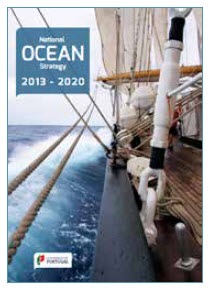PORTUGAL
OCEAN ENERGY POLICY
|
NATIONAL STRATEGY The three key pillars of the maritime economy are: Knowledge, Spatial Planning, and Promotion of National Interests. The plan defines strategic actions, such as the support for new forms of technology applied to maritime activities, by creating conditions for the installation, testing and development of emerging forms of technology. Available at: |
 |
REGULATORY FRAMEWORK
In March 2015, Law 38/2015 was published, implementing Law 17/2014, establishing the Policy on the National Maritime Areas Planning and Management (LBOGEM). LBOGEM defines the general principles applicable to maritime spatial planning and the legal framework relating to the use of Portugal’s maritime areas.
The Resolution of the Council of Ministers no. 57/2015, of 30 July, approved the Financial Instrument for Energy, promoting the diversification and use of clean energy sources. The funds shall be partially conveyed by the allocation of European structural and investment funds for the period from 2014 to 2020.
The Ministerial Order no. 202/2015, of 13 July, approved the remuneration regime applicable for wave energy and offshore wind projects, at an experimental or pre-commercial stage. A basic Feed-In Tariff of €80/MWh is set for these projects, applicable to the first 20 years of the project. This value can be increased by €20/MWh if the projects have received incentives from the Portuguese Fund Carbon (FPC).
PUBLIC FUNDING PROGRAMMES
In Portugal, FCT (The Foundation for Science & Technology) is the main funding agency for research covering all fields of science, including ocean energy. FCT is part of OCEANERANET, a network of 16 European national and regional funders and managers of research and innovation programmes, from 9 countries, in the field of ocean energy, funded by the European Commission. The first join call for proposals was launched in October 2014 and a number of projects were approved in 2015.
Agência Nacional de Inovação (ANI), which until September 2014 was known as AdI (Agência de Inovação), has also a role in funding applied research. It is managed together by the two ministries (Ministry of Education Ministry of Science, Technology and Higher Education and the Ministry of Economy). Its main purpose is to stimulate business-oriented research in Portugal. The main source of the funds it manages comes from the Operational Programmes.
Portugal 2020, signed by Portugal and the European Commission, is the main instrument for business investment for the period 2014-2020, defining the financing priorities in the application of the European Structural and Investment Funds in Portugal. It is comprised of four thematic Operational Programmes and seven regional Operational Programmes directly addressed to the promotion of research and innovation in the regions concerned. In particular these 2 topics can address marine energy technology:
- Competitiveness and internationalization through COMPETE 2020 Programme;
- Sustainability and efficient use of resources through PO SEUR Programme.
On the Portugal 2020 website (www.portugal2020.pt) there is a Plan of Calls for Proposals, which enables future applicants to prepare and plan their projects. The Balcão 2020 site (https://balcao.portugal2020.pt) provides guidelines for submitting proposals.
MARINE SPATIAL PLANNING POLICY
In March 2015, the Portuguese Law 38/2015 was created laying down the bases for the Planning and Management of the National Maritime Space (LBOGEM), defining the legal framework that allows for the implementation of marine spatial plans in the whole national maritime space, including the continental shelf beyond 200 nautical miles. The approval and implementation of Portugal’s legal regime on marine spatial planning and management of the national maritime space is a notable achievement for Portugal with respect to ocean governance.
PERMITTING AND LICENSING PROCESS FOR OCEAN ENERGY PROJECTS
- License for water resources utilization – managed by the Portuguese Environmental Agency (APA). This license is the main consent required and can be authorized through a license or concession:
- A license is required for devices deployed for less than one year and for installed capacity below or equal to 25 MW;
- A concession is mandatory for more lengthy time periods. In this case, a competitive public examination must be carried out, starting with a public announcement by the competent authority.
- Environmental license – managed by the Coordination Committee on Regional Development (CCDR), which is the regional authority;
- License for the power production or grid connection – a request made by the developer to the Portuguese Electricity Distribution (EDP);
- Building license for infrastructure on land (e.g. substation, cable routes) administered by the municipal council of the area where the project is to be installed.
TEST SITES
In Portugal, a specific site for wave energy development – offshore S. Pedro de Moel, between Figueira da Foz and Nazaré - with an area of 320 km2, was designated by the Portuguese State, in 2008. It is a demarcated maritime space in water depths between 30 and 90m. In 2010, ENONDAS (a subsidiary of the Portuguese Grid Transmission System Operator) received from the Portuguese State a public concession for this site for 45 years. Enondas has adopted the trading name of Ocean Plug. In 2015, there has not been much progress regarding the development of the infrastructure for the pilot zone.



